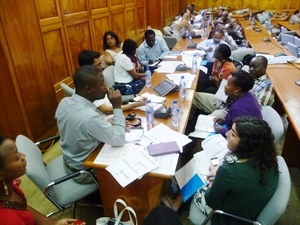Treatments in remote areas urgent to meet Millennium Development Goals
9 April 2014

Integrated Community Case Management (iCCM) is a strategy that enables those living beyond the reach of health facilities to access lifesaving treatments. It should be a national priority and an integral part of national health sector plans, a recent symposium in Ghana has concluded.
ICCM provides training to community health workers on how to screen and treat children for diarrhoea, pneumonia and malaria. The methods used are rapid diagnostic tests for malaria, disease history and respiratory rate counting for pneumonia.
Over 400 individuals from 35 countries in sub-Saharan Africa and 59 international partner organisations gathered in Accra to review the evidence behind iCCM.
Meeting child mortality targets
Reducing the mortality rate of children under five by two thirds is one of the United Nations Millennium Development Goals. Since 2000, the use of iCCM to treat such diseases has dramatically increased, with policies in 23 sub-Saharan Africa countries.
But in order to meet the target by 2015, governments must ensure that iCCM is a national priority, embedded in national health sector plans and has a clear budget, the meeting has found.
Evidence presented at the symposium showed that training community health workers is effective whether they are paid or volunteering, as long as there is clear commitment from high level ministries of health, technical support and supervision. However, charging patients fees to receive care in iCCM programmes decreases their use.
Participants agreed that donors and researchers should focus resources on scaling up and ensuring the quality of the system, and less on measuring its impact in mortality.
Interest in ACT Consortium studies on community health workers
More than 20 country teams attended the symposium, which consisted of donors, policy-makers, community health workers, implementers and researchers, including Dr Heidi Hopkins and Sham Lal from the ACT Consortium.
The Uganda country team delegation – composed of members of UNICEF, the Ministry of Health and the Clinton Health Access Initiative, among others (in photo) – demonstrated interest in ACT Consortium studies into the use of rapid diagnostic tests by community health workers, which was seen as an important step in understanding cost-effectiveness and implementation. The research team aims to disseminate results in Uganda in June.
The symposium acknowledged that more evidence is needed in several areas such as referral of sick children, targeting of appropriate treatment, partnerships between the private and public sectors, where iCCM should be deployed and more critically the cost-effectiveness of iCCM.
Further information
- Learn about the ACT Consortium studies on community health workers
- Download the policy brief on the community health workers study in Uganda
- Download the policy brief on the community health workers study in Afghanistan
- Visit the iCCM symposium website

